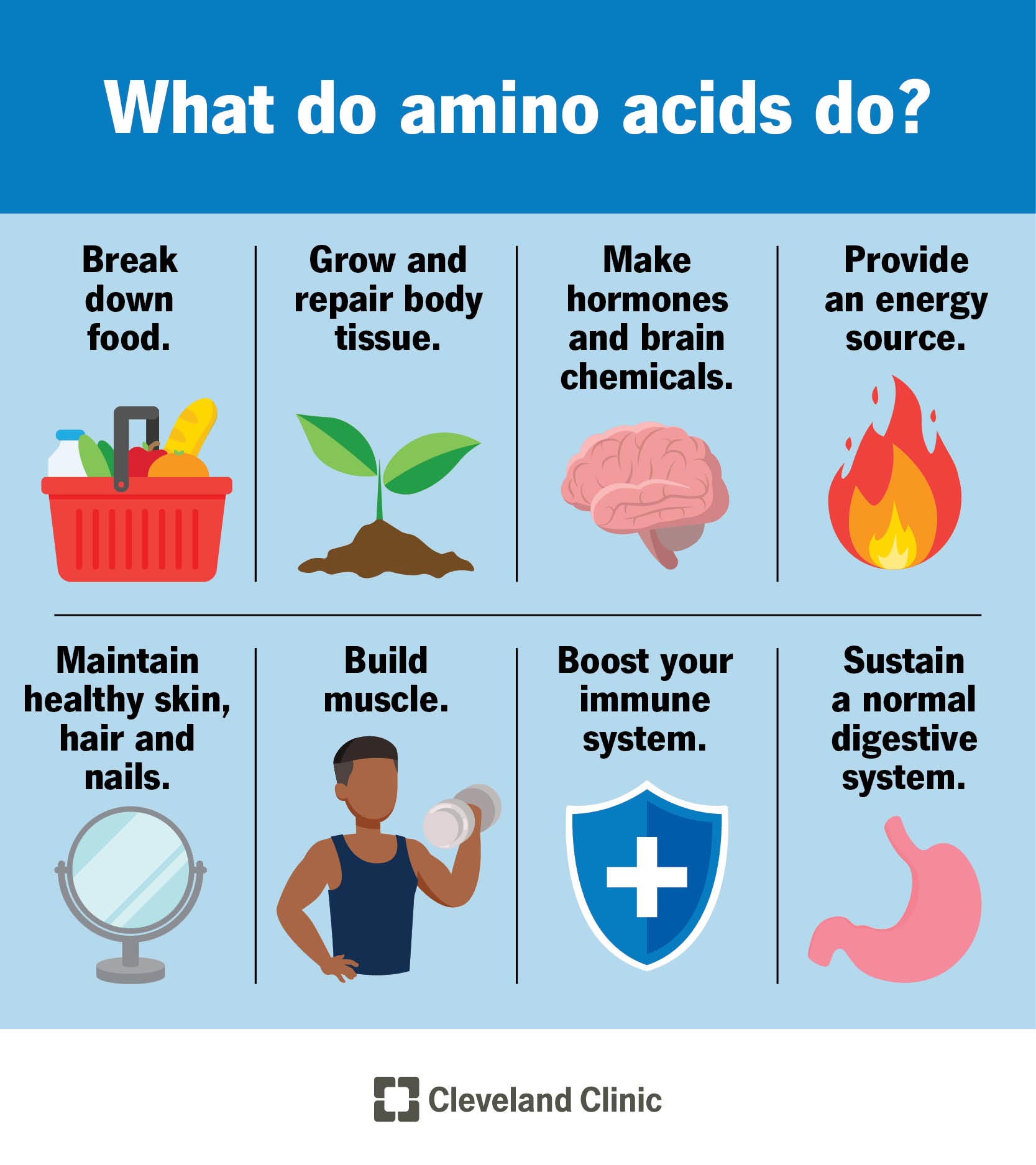The seven dietary sources of amino acids and their benefits include protein sources like meats, dairy, eggs, soy, black beans, quinoa, nuts, seeds, and whole grains. These foods provide essential amino acids that our bodies need to synthesize proteins vital for various bodily functions.
Amino acids serve as building blocks for proteins, play a role in protein synthesis, and contribute to forming essential compounds like antioxidants. Incorporating these amino acid-rich foods into our diet ensures that we meet our protein requirements and brings other health benefits.

Introduction To Amino Acids
Amino acids are essential for the body’s protein synthesis and have a range of health benefits. Some dietary sources of amino acids include meats, dairy, eggs, soy, black beans, quinoa, nuts, seeds, and whole grains. Incorporating these foods into a daily diet helps ensure the body receives all amino acids for optimal health.
What are amino acids?
Amino acids are the building blocks of proteins, which are essential for the proper functioning of our bodies. They are organic compounds containing an amino group (-NH2) and a carboxyl group (-COOH)—20 different amino acids are found in proteins, each with its own unique structure and function.
Importance Of Amino Acids In The Diet
Amino acids are crucial for various biological processes in our bodies. They play a vital role in synthesizing proteins necessary for tissue growth, repair, and maintenance. Amino acids also act as precursors for essential molecules such as neurotransmitters, enzymes, and hormones, which regulate various bodily functions.
Including amino acids in our diet is essential, as our bodies cannot produce all the essential amino acids independently. The body cannot synthesize essential amino acids, which must be obtained from external sources, such as food.
Now, let’s explore seven dietary sources of amino acids and their specific benefits.

Dietary Sources Of Amino Acids
Dietary sources of amino acids include meats, dairy, eggs, soy, black beans, quinoa, nuts, seeds, and whole grains. These foods are easy to incorporate into your daily diet and provide many health benefits. Amino acids are essential for protein synthesis and are crucial to the body’s overall functioning.
Amino acids are the building blocks of proteins and play a crucial role in various bodily functions. While our bodies can produce some amino acids, there are nine essential amino acids that we need to obtain from dietary sources. Incorporating these essential amino acids into our diet is necessary for maintaining optimal health and wellbeing. This article will explore seven nutritional sources of amino acids and their benefits.
Meat And Poultry
Meat and poultry are excellent sources of complete protein, providing all nine essential amino acids our bodies require. Whether beef, chicken, turkey, or pork, these meats are packed with amino acids that support muscle growth, repair tissues, and enhance immune function.
Dairy Products
Dairy products like milk, cheese, and yoghurt are rich sources of essential amino acids. They offer a complete set of amino acids necessary to maintain healthy bones, support muscle growth, and facilitate proper nutrient absorption. Additionally, dairy products provide valuable calcium and vitamin D, essential for bone strength.
Plant-based Sources
Plant-based sources of amino acids include legumes, whole grains, nuts, and seeds. While these sources may not provide all nine essential amino acids in a single food item, they can be combined to create complete protein profiles. When paired with grains like rice or quinoa, legumes such as beans and lentils can form a complementary protein combination that meets our body’s amino acid requirements.
Nuts and seeds also contribute to our amino acid intake. Almonds, for example, are rich in methionine, an essential amino acid involved in protein synthesis and various vital processes within the body. Eating a variety of nuts and seeds ensures a diverse amino acid profile.
Furthermore, whole grains like quinoa and buckwheat contain amino acids and are great alternatives for those following a plant-based diet. They provide abundant nutrients along with their amino acid content, supporting overall health and wellbeing.
Incorporating these dietary sources of amino acids into your meals can help ensure you meet your body’s essential amino acid requirements. Whether you choose meat and poultry, dairy products, or plant-based sources, each offers unique benefits and contributes to your overall nutrition.
Benefits Of Amino Acids In The Diet
Amino acids in the diet have various benefits, and there are several dietary sources to choose from. Foods such as meats, dairy, eggs, soy, black beans, quinoa, nuts, seeds, and whole grains are high in essential amino acids. These amino acids are necessary for the body to build proteins, which are crucial in structural components, enzymes, and hormones.
Including these foods in the diet can promote overall health and wellbeing.
Benefits of Amino Acids in the Diet
Amino acids are the building blocks of proteins and play a crucial role in maintaining optimal health. Including various dietary sources rich in amino acids can benefit our bodies. Let’s explore some critical advantages of incorporating amino acids into our diets.
Building Protein
Proteins are essential for the growth, repair, and maintenance of our bodies’ tissues, organs, and muscles. Amino acids are responsible for building and repairing these proteins. Including a range of amino acid-rich food sources in our diet ensures that our bodies have sufficient amino acids to construct the proteins necessary for various bodily functions.
Regulating Hormones
Amino acids also play a vital role in regulating hormones in our bodies. Hormones are chemical messengers that control several biological processes, including metabolism, growth, and mood regulation. Certain amino acids, such as tyrosine and tryptophan, are precursors to essential hormones like dopamine and serotonin. By consuming foods rich in these amino acids, we can support the production and balance of hormones in our bodies.
Supporting Neurotransmitters
Neurotransmitters are chemical substances that transmit signals between nerve cells in our brains. Amino acids, such as glutamate and gamma-aminobutyric acid (GABA), are involved in synthesizing and regulating neurotransmitters. These neurotransmitters, including cognition, mood regulation, and sleep, influence our brain function. Including amino acid-rich foods in our diet ensures that our bodies have an adequate supply of these crucial neurotransmitter components.
By ensuring we have a well-rounded diet that includes various dietary sources of amino acids, we can experience the numerous benefits they provide. From building and repairing proteins to regulating hormones and supporting neurotransmitters, amino acids play a vital role in maintaining optimal health and wellbeing.
Here are some familiar dietary sources of amino acids and their benefits:
| Dietary Source | Amino Acids | Benefits |
|---|---|---|
| Meats, Dairy | All essential amino acids | Complete protein sources for building and repairing tissues |
| Eggs | All essential amino acids | Complete protein source; supports muscle development and repair |
| Soy, Black Beans, Quinoa | All essential amino acids | Plant-based complete protein sources support muscle growth and overall health. |
| Nuts, Seeds | Various amino acids, including arginine and tryptophan | Provide essential amino acids and support heart health, brain function, and immune system |
| Whole Grains | Different amino acids, including tryptophan and lysine | Provide essential amino acids and support energy production and brain function |
Including these dietary sources in our daily meals allows us to obtain the amino acids needed to maintain our body’s physiological processes. By understanding the benefits and incorporating these sources into our diets, we can optimize our overall health and wellbeing.

Frequently Asked Questions On 7 Dietary Sources Of Amino Acids And Their Benefits
What Food Has All 7 Amino Acids?
Eggs are a food that contains all nine essential amino acids. Other examples include soy, black beans, quinoa, nuts, seeds, meats, dairy, and whole grains. Incorporating these foods into your daily diet provides all seven amino acids necessary for optimal health.
What Are Amino Acid Benefits & Food Sources?
Amino acids have various benefits and can be found in protein-rich foods such as meats, dairy, eggs, soy, black beans, and quinoa. Nuts, seeds, and whole grains are also good sources. Amino acids are essential for protein synthesis, serving as building blocks for proteins and playing vital roles in the body’s processes.
Why Are 7 Amino Acids Considered Essential?
The seven amino acids are essential because our bodies cannot produce them independently and must be obtained through diet.
What Are The 11 Amino Acids We Must Obtain From Food?
The 11 amino acids we must obtain from food are phenylalanine, valine, threonine, tryptophan, methionine, leucine, isoleucine, lysine, histidine, arginine, and essential amino acid. These amino acids are vital for protein synthesis and cannot be produced by our bodies.
Conclusion
Incorporating various protein-rich foods into your diet ensures you get all the essential amino acids your body needs. Meats, dairy products, eggs, soy, black beans, quinoa, nuts, seeds, and whole grains are all excellent sources of amino acids.
Not only do these foods provide the building blocks for protein synthesis, but they also offer additional health benefits. You can support various bodily functions and maintain optimal health by including these dietary sources in your daily meals. Start incorporating these foods into your diet today and reap the benefits of a well-rounded amino acid intake.

